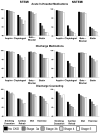Use of evidence-based therapies in short-term outcomes of ST-segment elevation myocardial infarction and non-ST-segment elevation myocardial infarction in patients with chronic kidney disease: a report from the National Cardiovascular Data Acute Coronary Treatment and Intervention Outcomes Network registry
- PMID: 20065168
- PMCID: PMC2874063
- DOI: 10.1161/CIRCULATIONAHA.109.865352
Use of evidence-based therapies in short-term outcomes of ST-segment elevation myocardial infarction and non-ST-segment elevation myocardial infarction in patients with chronic kidney disease: a report from the National Cardiovascular Data Acute Coronary Treatment and Intervention Outcomes Network registry
Abstract
Background: Chronic kidney disease (CKD) is a risk factor for myocardial infarction (MI) and death. Our goal was to characterize the association between CKD severity and short-term outcomes and the use of in-hospital evidence-based therapies among patients with ST-segment elevation MI (STEMI) and non-ST-segment elevation MI (NSTEMI).
Methods and results: The study sample was drawn from the Acute Coronary Treatment and Intervention Outcomes Network registry, a nationwide sample of STEMI (n=19 029) and NSTEMI (n=30 462) patients. Estimated glomerular filtration rate was calculated with the Modification of Diet in Renal Disease equation in relation to use of immediate (first 24 hours) therapies and early (first 48 hours) cardiac catheterization as well as in-hospital major bleeding events and death. Overall, 30.5% and 42.9% of patients with STEMI and NSTEMI, respectively, had CKD. Regardless of MI type, patients with progressively more severe CKD had higher rates of death. For STEMI, the odds ratio for stage 3a, 3b, 4, and 5 CKD compared with patients with no CKD was 2.49, 3.72, 4.82, and 7.97, respectively (P(trend)<0.0001). For NSTEMI, the analogous odds ratios were 1.81, 2.41, 3.50, and 4.09 (P for trend <0.0001). In addition, patients with progressively more severe CKD were less likely to receive immediate evidence-based therapies including aspirin, beta-blockers, or clopidogrel, were less likely to undergo any reperfusion (STEMI) or revascularization (NSTEMI), and had higher rates of bleeding.
Conclusions: Reports over the past decade have highlighted the importance of CKD among patients with MI. Data from this contemporary cohort suggest that patients with CKD still receive fewer evidence-based therapies and have substantially higher mortality rates.
Conflict of interest statement
The authors report the following conflicts of interest: Kontos-Speakers Bureau: Sanofi-Aventis, Schering-Plough, Pfizer; Consultant: Sanofi-Aventis, Schering-Plough, Pfizer; Inovise Technologies, Mollecular Insight Pharmaceuticals; Research Support: Amersham/GE, Inovise Technologies, Biosite, Molecular Insight Pharmaceuticals; Saucedo –Eli Lilly, Bristol Myers Squibb/Sanofi, The Medicines Company, Research and Honoraria from Schering Plough, Honoraria Pfizer; Alexander-no conflicts, Wiviott- Sanofi - Aventis: Consulting; Eli Lilly -Research, Honoraria; Daiichi Sankyo -Research, Honoraria; Astra-Zeneca - Honoraria; Schering-Plough: Research, Pfizer - Honoraria, Roe- Receives research funding and serve as a consultant and member of the speakers bureaus for the companies that fund the ACTION registry via the American College of Cardiology - BMS/Sanofi-Aventis, and Schering-Plough. Cannon-Research grants/support from the following companies: Accumetrics, AstraZeneca, Bristol-Myers Squibb/Sanofi Partnership, Glaxo Smith Kline, Merck, Merck/Schering Plough Partnership; Clinical Advisor, equity in Automedics Medical Systems. The remainder of the authors report no conflicts
Figures



References
-
- Coresh J, Selvin E, Stevens LA, Manzi J, Kusek JW, Eggers P, Van LF, Levey AS. Prevalence of chronic kidney disease in the United States. JAMA. 2007;298:2038–2047. - PubMed
-
- U.S. Renal Data System. Atlas of Chronic Kidney Disease and End-Stage Renal Disease in the United States. Bethesda, MD: 2008. USRDS 2008 Annual Data Report, National Institutes of Health, National Institute of Diabetes and Digestive and Kidney Diseases.
-
- Manjunath G, Tighiouart H, Ibrahim H, MacLeod B, Salem DN, Griffith JL, Coresh J, Levey AS, Sarnak MJ. Level of kidney function as a risk factor for atherosclerotic cardiovascular outcomes in the community. J Am Coll Cardiol. 2003;41:47–55. - PubMed
-
- Manjunath G, Tighiouart H, Coresh J, MacLeod B, Salem DN, Griffith JL, Levey AS, Sarnak MJ. Level of kidney function as a risk factor for cardiovascular outcomes in the elderly. Kidney Int. 2003;63:1121–1129. - PubMed
-
- Mann JF, Gerstein HC, Pogue J, Bosch J, Yusuf S. Renal insufficiency as a predictor of cardiovascular outcomes and the impact of ramipril: the HOPE randomized trial. Ann Intern Med. 2001;134:629–636. - PubMed
Publication types
MeSH terms
Grants and funding
LinkOut - more resources
Full Text Sources
Other Literature Sources
Medical
Miscellaneous

